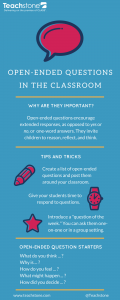If I were sitting in person with you right now, I could ask either: Do you like open-ended questions? OR What power do open-ended questions have in the classroom? Which would guide us towards a more meaningful conversation? You guessed it 😊– the second one! Ok, so that was easy! Knowing the difference between a closed or open-ended question is the simple part but the intentionality and practice can be more complex.
 I have personally seen the power of open-ended questions with my four-year-old. Many of his questions include “What if…” and “What would happen when…” These open-ended questions he asks me have led to lively discussions about bridges, the sky, food, families, safety, and what he wants to be when he grows up…just to name a few of the topics we have covered! When we are engaged in this type of conversation, I can ask him the question, “What do you think?” Sometimes, I can be stopped short and not always get to that question but when I intentionally slow down and engage in meaningful conversation, I see the wonder light up in his eyes.
I have personally seen the power of open-ended questions with my four-year-old. Many of his questions include “What if…” and “What would happen when…” These open-ended questions he asks me have led to lively discussions about bridges, the sky, food, families, safety, and what he wants to be when he grows up…just to name a few of the topics we have covered! When we are engaged in this type of conversation, I can ask him the question, “What do you think?” Sometimes, I can be stopped short and not always get to that question but when I intentionally slow down and engage in meaningful conversation, I see the wonder light up in his eyes.
Let’s examine the power of the process when we ask, listen, and encourage as we use open-ended questions.
The Responsive Classroom wrote an article called, “Open-Ended Questions,” and shared this powerful statement from an adapted excerpt in the book The Power of Our Words: Teacher Language That Helps Children Learn, by Paula Denton, EdD.
“The power of open-ended questions comes from the way these questions tap into that natural cycle, inviting children to pursue their own curiosity about how the world works. Open-ended questions show children that their teachers trust them to have good ideas, think for themselves, and contribute in valuable ways. The resulting sense of autonomy, belonging, and competence leads to engagement and deep investment in classroom activities.”
Start with yourselves! Here is a simple game that can be used at your next staff meeting to practice the idea of closed vs. open-ended questions.
How will you incorporate open-ended questions and encouraging statements in your program this week?
“Good teaching is more a giving of right questions than a giving of right answers.” – Josef Albers (1888-1976)
For breakfast: Iced coffee, a bowl of cereal, and a banana 🙂
Author: @kristinstayer
Julia Gabor
Loved this blog! It’s a great tool to help kids think for themselves…open-ended questions!